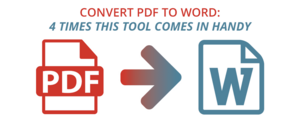The pros and cons of converting a PDF to Word
By | on
One of the most popular search engine queries relating to PDFs is "PDF to Word". When I looked at the data, the first thought that jumped out at me was: "I know why! Everyone wants to edit a PDF using a format they are familiar with!". While I wasn’t sure of my hunch back then, I now believe that my instincts were correct. The biggest issue with PDFs (and ironically, also their main strength) is that they are very difficult to edit. Users of PDF files who are stuck trying to make edits usually react in two ways – they either try to find a tool that will let them make edits directly or they try to convert a PDF to another file format.
Table of Contents
Converting a PDF to Word can be a practical solution for many individuals and businesses, offering various advantages and disadvantages. Users in both camps will usually find a wide range of online and desktop software-based solutions that can meet their needs. As I’ve discussed earlier, there are pros of cons of heading down either route. Online solutions tend to be much cheaper (and often free), but may not fully meet a user’s needs given the limitations of browser-based technologies. There are also issues regarding privacy and data protection that make many business users uncomfortable with online solutions. On the other hand, desktop software is usually much better at solving PDF-related issues, however most desktop-based solutions are quite pricey. At DocFly, we offer both an online PDF editor as well as an online PDF to Word converter. Even with the limitations of building software within a browser, we try to meet the needs of our users as much as possible.
The benefits of converting a PDF to Word
If online PDF editors don’t meet your need and you are looking for another cost-effective way to edit a PDF file, you only have two options: (1) find a good desktop software trial or (2) find a good online PDF to Word converter. I’ve already covered my recommendations for PDF software, so I’ll skip repeating myself in this post.
Easy editing, especially text editing
On the positive side, converting a PDF to Word format allows for easy editing and manipulation of the content. Word processing software, like Microsoft Word, provides a plethora of tools for formatting, adding text, images, and making revisions to the document. This level of flexibility is particularly useful when you need to update or customize a PDF document without altering its original layout.
Thus the clear benefit to converting a PDF to Word is that you can directly edit the text. This level of editing is not possible using most PDF editors, and is the reason we offer an online PDF to Word converter. Once you successfully convert a PDF to Word, you can easily make edits using Word or similar software. Converting a Word back to PDF is as simple as choosing the PDF format when saving the document (instead of .doc or other document formats). Thus converting a PDF into an editable file format is a good workaround for the limitations of the format.
Better collaboration
Another advantage of converting PDF to Word is improved collaboration and sharing. PDFs can sometimes be restrictive, limiting the ability to collaborate effectively with others. By converting to Word, multiple users can work on the document simultaneously, making edits, comments, and track changes. This promotes a more efficient workflow, especially in team-based environments where seamless collaboration is essential.
The drawbacks to converting a PDF to Word
Unfortunately, using a PDF converter is far from a silver bullet to all your PDF issues! The main issue is that most PDF converters aren’t very good. Retaining the original formatting of your PDF is an incredibly difficult computer science challenge, mainly because PDF files are created by virtually printing objects onto a blank sheet of paper. Unlike most other file types (e.g. documents, presentations, etc.) there no rules governing where objects are placed on the page. This makes converting PDFs to other file formats very difficult.
Complex PDF files are hard to convert
Converting to Word might cause discrepancies in formatting, leading to a less polished and professional-looking document. Furthermore, complex PDF files with intricate graphics or extensive tables may not convert accurately to Word. The conversion process may result in elements getting misaligned or appearing differently, which can be time-consuming to correct manually.
Security is also a significant issue
Another consideration is the security aspect. PDFs offer built-in security features that can be crucial for protecting sensitive information. When converting to Word, these security features may get compromised, leaving the document vulnerable to unauthorized access or modifications.
DocFly tries to strike a balance
In conclusion, converting a PDF to Word has its merits and limitations. It provides enhanced editing capabilities and facilitates collaboration, making it suitable for various scenarios. However, users should be mindful of potential formatting issues and security concerns that may arise during the conversion process. Assessing the specific needs of the document and the desired end result will help determine whether converting to Word is the most appropriate choice.
At DocFly, we’ve tried to address this problem by building the best possible PDF converter. In our opinion, our PDF converter is the one of the best in the industry and does a great job of retaining the original formatting of a PDF file. While the solution is far from perfect, we hope it meets the needs of most of our users!
Loved what you just read? Share it!




